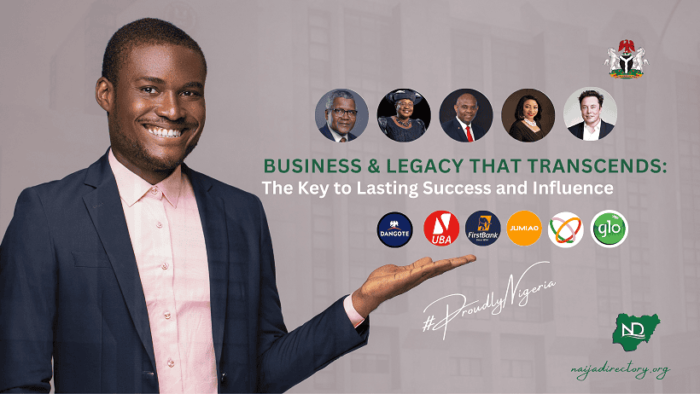
Business & Legacy That Transcends: The Key to Lasting Success and Influence
In a world where new enterprises emerge daily, only a few manage to stand the test of time and influence generations. These are businesses that transcend. But what does it mean for a business to transcend, and how can entrepreneurs build enterprises that not only survive but leave an enduring mark? Let’s explore the core principles behind businesses that achieve this level of impact and longevity.
Table of Contents
ToggleDefinitions of Some Terms
- Transcendent Business: A business that outlives its competitors, influencing future generations through purpose, innovation, and strong relationships.
- Legacy: The lasting impact a business leaves, reflected in its values, achievements, and contributions to society.
- Social Responsibility: A company’s commitment to addressing societal issues through sustainable and ethical practices.
- Visionary Leadership: Leadership that prioritizes long-term success, adaptability, and strategic innovation.
1. Purpose Beyond Profit

A transcendent business has a purpose that goes beyond making money. Profit is crucial for sustainability, but companies that focus solely on it often struggle to build lasting loyalty or influence. Successful businesses start with a mission that resonates with both their customers and employees on a deeper level. This purpose-driven approach creates a sense of belonging and shared values, motivating people to support and stick with the business.
For instance, At Naijadirectory, our mission is to foster connections, share valuable information, and bring together people, businesses, and organizations, both locally and globally. We are dedicated to showcasing the best of Nigeria while empowering local enterprises and international companies to tap into the vast potential of the Nigerian market. Additionally, we offer cutting-edge technology services and innovations, helping businesses connect, and thrive in the digital landscape. Constantly supporting charities, especially kids, teens, and the elderly. By aligning our efforts with values that promote unity, collaboration, and sustainability, we inspire both our team and community, giving our platform a purpose beyond profit and strengthening relationships across the board. About us.
2. Innovation as a Habit

Businesses that transcend their competition are those that adapt to change and continually innovate. They don’t rest on the success of a single winning formula or product; instead, they anticipate industry shifts and invest heavily in research and development to stay ahead. By positioning themselves at the forefront of change, they establish themselves as industry leaders.
A great example is Apple, which has become synonymous with innovation by constantly reinventing its products and enhancing user experiences. Apple’s commitment to pushing boundaries has helped it maintain a competitive edge, ensuring its relevance across generations.
In Nigeria, Interswitch exemplifies this adaptive approach. As a pioneer in digital payments, Interswitch has consistently evolved its services to meet the growing demand for seamless financial transactions. By embracing new technologies and responding to the dynamic needs of its users, Interswitch has positioned itself as a leader in Africa’s fintech space, transcending market shifts and setting the standard for the industry.
3. Building Strong Relationships
 Businesses that transcend understand the power of strong relationships—with employees, customers, and even competitors. These companies foster a culture of respect, loyalty, and collaboration, knowing that people form the backbone of any successful organization.
Businesses that transcend understand the power of strong relationships—with employees, customers, and even competitors. These companies foster a culture of respect, loyalty, and collaboration, knowing that people form the backbone of any successful organization.
Internally, they prioritize employee well-being and growth, recognizing that a motivated team is crucial to long-term success. Externally, they engage with customers authentically, listening to feedback, and building trust over time. This relationship-focused approach enables them to navigate market challenges with a dedicated customer base and an engaged workforce.
4. Commitment to Social Responsibility

In today’s world, social responsibility is no longer just a trend; it has become a fundamental expectation. Transcendent businesses actively engage with their communities and address social issues, aligning their efforts with causes that reflect their core mission. This approach helps them create an enduring legacy that resonates with people’s values, strengthening their brand image and building long-term loyalty.
Unilever Nigeria, for instance, has been a vocal advocate for sustainability and community development. Through initiatives focused on health, education, and environmental sustainability, Unilever has positioned itself as a company that cares about societal progress. This commitment has helped foster a loyal customer base that values the brand’s alignment with important causes, turning customers into passionate advocates.
Similarly, global brands like Patagonia have long championed environmental causes, dedicating significant resources to climate action and sustainable practices. Their outspoken stance on protecting the planet has not only built a strong reputation but also attracted a devoted following of customers who share the same values, creating a powerful community of advocates rather than just buyers.
5. Adapting to Technology and Globalization
The rapid rise of technology and globalization has transformed the business landscape, creating a highly competitive environment. Transcendent businesses are those that embrace these forces rather than resist them. By adopting digital transformation strategies and tapping into international markets, these companies leverage technology and global resources to expand their reach and amplify their impact.
Flutterwave, a leading Nigerian fintech company, is a prime example. By utilizing cutting-edge technology to streamline digital payments across Africa, Flutterwave has enabled seamless financial transactions for businesses and consumers alike. Their innovative platform connects African markets with the global economy, allowing enterprises of all sizes to tap into new opportunities and scale rapidly.
Similarly, global giants like Amazon have harnessed the power of technology to optimize operations, personalize customer experiences, and expand their presence across international borders. By embracing technological advancements, these transcendent businesses operate more efficiently, access new markets, and deliver a customer experience that sets them apart from the competition, cementing their status as industry leaders.
6. A Visionary Leadership
Leaders who think beyond immediate profits and prioritize sustainable growth lay the groundwork for transcendent businesses. Visionary Leaders like Aliko Dangote, Tony Elumelu, Folorunsho Alakija, Ibukun Awosika, Ngozi Okonjo-Iweala, Elon Musk, and Oprah Winfrey, etc, have propelled their organizations to new heights by championing innovation and setting ambitious goals. These leaders encourage their teams to embrace challenges, think creatively, and pursue long-term success.
Effective leadership sets a tone of dedication and perseverance, enabling companies to remain resilient and adaptable in a rapidly changing environment. When leaders stay true to their values and vision, this commitment resonates throughout the entire organization, inspiring everyone to align with shared goals and strive for excellence.
7. Exceptional Customer Experience
In an era where consumers have countless options, businesses that truly stand out are those that prioritize exceptional customer experiences. Transcendent companies put their customers first, building trust through high-quality service and meticulous attention to detail. They anticipate customer needs, actively listen to feedback, and continuously enhance their products and services.
A prime example from Nigeria is Jumia, the leading e-commerce platform in Africa. Jumia has become synonymous with outstanding customer service by offering a seamless shopping experience, flexible payment options, and prompt delivery. Their commitment to customer satisfaction has built a loyal user base and established them as a trusted brand across the continent, regardless of market fluctuations or shifting consumer trends.
8. Leaving a Legacy

A transcendent business is not solely focused on immediate success; it aims to leave a lasting legacy. By building a company that reflects core values, prioritizes social responsibility, and fosters genuine connections, you lay the foundation for a brand that future generations will remember and celebrate. The most enduring companies—those that have thrived for over a century—have done so by creating a legacy rooted in resilience, integrity, and a clear sense of purpose.
First Bank of Nigeria, founded in 1894, is a prime example of a legacy business. Over its long history, the bank has weathered numerous economic changes and evolved to meet the needs of its customers while maintaining its commitment to integrity and service. This dedication to core values has solidified its status as a trusted institution in Nigeria and beyond.
Similarly, global icons like Coca-Cola have built legacies by consistently aligning their business practices with their values and staying adaptable in changing markets. Their focus on community engagement, innovation, and creating memorable customer experiences has helped them remain relevant across generations, transforming their brand into a timeless symbol recognized worldwide.
Creating a legacy is about more than profit—it’s about making a lasting impact that echoes through time, shaping industries, and inspiring future leaders.
FAQ
- What does it mean for a business to transcend? It means achieving long-term success and influence, driven by a clear mission, innovation, and strong relationships with stakeholders.
- How do businesses build a lasting legacy? By creating a purpose-driven company, staying adaptable to changes, and aligning with societal values.
- Why is social responsibility important for transcendent businesses? It strengthens brand loyalty, enhances reputation, and aligns the company with the values of its customers.
- What role does leadership play in a transcendent business? Visionary leaders drive innovation, inspire long-term thinking, and set the tone for a resilient, purpose-driven culture.
- How can businesses maintain relevance across generations? By continuously innovating, adapting to new technologies, and fostering strong customer relationships.
Conclusion
Building a business that transcends goes beyond having a strong business model or a profitable product. It requires a clear sense of purpose, adaptability, continuous innovation, and a steadfast commitment to values that resonate with people. Transcendent businesses are those that achieve lasting success while inspiring others, driving meaningful change, and making a lasting impact on their communities and industries.
Ultimately, it’s about creating a legacy that outlives its founders—a legacy that stands as a testament to what can be accomplished when a company is rooted in purpose and guided by a vision that looks far beyond immediate gains. These businesses not only thrive in their own time but also pave the way for future generations, embodying the idea that true success is measured by the enduring mark they leave on the world.
Quick Links
- Digital Transformation in Business
- How to Discover Business Opportunities in Your Environment
- Information Required to Add Your Business to Naijadirectory: A Step-by-Step Guide
- How to Start a Lucrative Business: A Comprehensive Guide
- 10 Tips for Creating a Small Business Marketing Budget
- What are the Types of Business Registrations in Nigeria?
- Business Name Registration in Nigeria
- Top 10 Strategies for Advertising Your Business in Nigeria
How useful was this post?
Click on a star to rate it!
Average rating 0 / 5. 0
We are sorry that this post was not useful for you!
Let us improve this post!
Tell us how we can improve this post?
All Categories
Tags
SPONSORED

Subscribe now to get direct updates
Join Naijadirectory Newsletter





